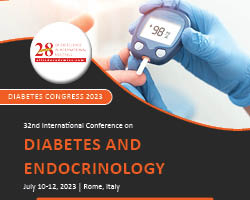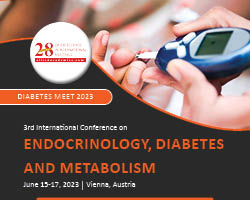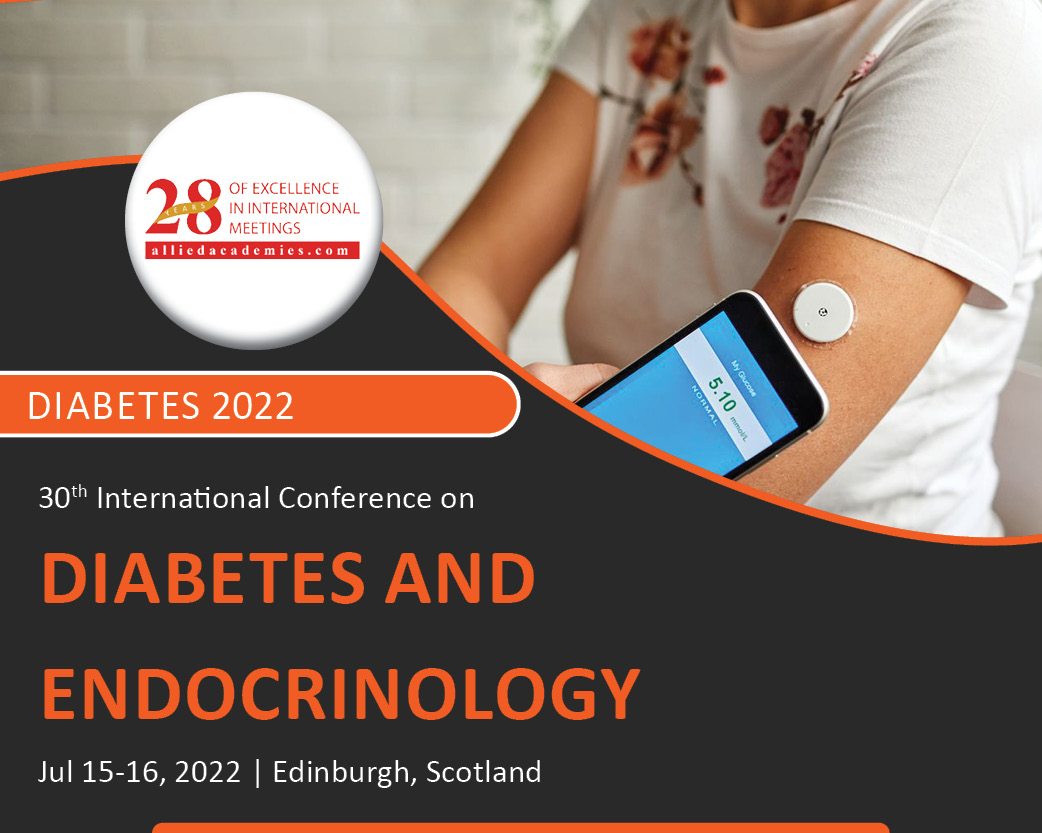2023 Conferences
2022 Conferences
2021 Conferences
2020 Conferences
Allied Academies organizing Diabetes conferences and related topics like endocrinology, obesity, cardiovascular diseases, contends to fosterhealthy deliberations of topics in regard. As the treatment of Diabetes hasbeen changed over time due to the technological advancements: right from thedisclosure, decontamination, and abundant production of insulin to the burgeonof slight painful ways to deliver it, the lives of people with diabetes havebeen surpassed— and sometimes greatly broadened— by both diabetes-engrossedresearch and broader upswings in medical care. The insights of the field, beingshared by the right expertise would be extremely beneficial.
Endocrinology is an area of research and medicine that studies the endocrine system, including its disorders and specific discharges like hormones, growth, and danger. Diabetes and endocrinology is a broad topic of medicine that focuses on the diagnosis and treatment of disorders caused by abnormal hormone production or activity, as well as the endocrine glands that produce these hormones. This requires a fundamental understanding of physiology and pharmacology, as well as the ability to improve long-term patient outcomes through effective disease management and, in some circumstances, cures. Endocrine diseases and diabetes affect every physiological system in the body, requiring specialists to employ a varied range of abilities and knowledge.
Market Analysis of Endocrinology and Diabetes:
The Endocrine Research market was worth USD 9,170.62 million in 2020, and it is expected to grow to USD 13,119.51 million by 2026, with a CAGR of 6.15 percent during that time period.
Many research investigations have showed that people with thyroid issues are more susceptible to the COVID 19 virus, resulting in a high demand for various endocrine tests to test and conduct thyroid hormone levels around the world during the pandemic. The more severe the COVID-19, the lower the TSH and TT3 levels were, with mathematical significance, according to a January 2021 research report titled "Thyroid Function Analysis in 50 Patients with COVID-19: A Retrospective Study." The severity of the declines in TSH and TT3 levels was positively related to the disease's difficulties.
Globally, the number of people diagnosed with diabetes is rising. Diabetes and its consequences are expected to kill around 4 million persons aged 20 to 79 years in 2020. Diabetes is thought to be responsible for 11.3 percent of all fatalities among adults in this age range worldwide. According to the AACE (American Association of Clinical Endocrinologists), recent research has found that 22.2 percent to 26.9% of people hospitalized for serious condition have diabetes. In hospitalized Coronavirus patients, diabetes and high glucose levels are linked to increased complications, respiratory failure, and fatality.
Furthermore, the market is predicted to rise as the world's population ages, and as people become more aware of the importance of early detection and treatment. Endocrine testing is used to determine the quantities of hormones secreted by the endocrine glands as well as to diagnose illnesses like obesity, diabetes, and thyroid disease. According to the International Federation, there were roughly 463 million adults living with diabetes in 2019, with that number expected to climb to 700 million by 2045.
The increased prevalence of diabetes and thyroid problems in several nations throughout the world is expected to boost market expansion. The high cost of developing testing technologies, on the other hand, is likely to limit market growth throughout the forecast period. According to statistics provided by the CDC, the global incidence of diabetes among adults was projected to be 9% in 2014. Furthermore, due to novel medication therapies and the presence of strong product pipelines in the endocrinology pharmaceuticals market for the treatment of both kinds of diabetes mellitus, this category is expected to develop at the quickest rate over the next seven years. The lack of new and effective medicinal options for the treatment of diabetes is fueling the segment's growth.
The predicted rising demand–supply disparity between 2010 and 2020 has never been more accurate or frightening than it is today. According to a more recent analysis, the shortage of adult endocrinologists will reach 2700 by 2025 if no action is taken.
Scope and Importance Endocrinology and Diabetes:
The Diabetes and Endocrinology Conference covers a wide range of topics and is available to the general public. This conference will provide an opportunity to explore the most recent discoveries in diabetes and endocrinology. Diabetes conferences bring together scientists and practitioners from various fields, resulting in a more comprehensive understanding. We recognize that comprehending scientific research is easier and more delicate than comprehending Diabetes. Secular health trends, consumer expectations, and the globalization of health will all influence endocrinology practise in the future. Endocrine therapy will continue to be driven by advances in drug delivery technology, pharmacogenomics.
Recent Developments in Diabetics and Endocrinology:
Diabetes Conference | Endocrinology Conference | Diabetes Conferences | Endocrinology Conferences | Hyperthyroidism Conference | Thyroid Disorder Conference | Diabetic Nephropathy Conference | Diabetic Retinopathy Conference | Gestational Diabetes Conference | Diabetes Conferences | Hormone disorder Conference | Polycystic Ovary Syndrome Conference | Pediatric Endocrinology conference | Endocrinology Meetings
Below is three of the most exciting new advances for diabetics and Endocrinology, each of which opens up a whole new universe of possibilities.
The Autoimmune Response is being suppressed. The exact cause or causes of type 1 diabetes have yet to be identified by medical professionals.
- Developing an Artificial Pancreas and Rejuvenating Beta Cells
- Metabolite signalling logic and processes.
- Incretins and twincretins are playing an increasingly important role.
- COVID-19, metabolic disorders, and vaccine-breakthrough infections
- Exercise's cardiometabolic benefits and molecular transducers
- New information on cell death, regeneration, and replacement.
DexCom, Medtronic, Abbott, Novo Nordisk, Nemaura, One Drop, and BeatO Smart Glucometer are just a few of the leading diabetes and endocrinology companies. Tandem Diabetes Care will launch an integrated Diabetes solution in June 2020, combining Abbott's Continuous Blood Glucose Monitoring (CGM) technology with Tandem's revolutionary insulin delivery system to give patients more alternatives for controlling their diabetes. It also announced that a contract to commercialise it had been signed. Medtronic unveiled the MiniMed Mio Advance Infusion Set in July 2020, which will reduce the number of insertion operations for diabetics in the US. The MiniMed Mio Advance Infusion Set is the newest addition to the MiniMed portfolio, giving the best user experience with fewer steps for people who use insulin pumps.
Endocrinology's Leading Associations and Hospitals around the World:
Endocrine Society, American Association of Clinical Endocrinologists, American Association of Endocrine Surgeons, Association of Program Directors in Endocrinology, Diabetes, and Metabolism, Society for Endocrinology, Brazilian Society of Surgical Endocrinology, British Society for Pediatric Endocrinology and Diabetes, European Society of Endocrinology, International Society of Endocrinology, Pediatric Endocrinology, International Society of Endocrinology.
Mayo Clinic - Rochester is one of the best hospitals for diabetes and endocrinology. Massachusetts General Hospital, Cleveland Clinic Asan Medical Center, The Johns Hopkins Hospital, Ospedale San Raffaele - Gruppo San Donato, Severance Hospital - Yonsei University, The Catholic University Of Korea - Seoul St. Mary's Hospital, Charité - Universitätsmedizin Berlin, Brigham And Women's Hospital, Seoul National University Hospital, New York-Presbyterian Hospital-Columbia and Cornell.
Future Scope of Diabetes and Endocrinology:
According to the World Health Organization (WHO), diabetes will affect roughly 350 million individuals worldwide by 2030. The majority of the food we consume is turned into glucose or sugar. This glucose or sugar is now utilized as a source of energy. Insulin is responsible for transporting glucose to bodily cells and Secular health trends, consumer expectations, and the globalization of health will all influence endocrinology practice in the future. Endocrine therapy will continue to be driven by advances in drug delivery technology, pharmacogenomics, combinatorial chemistry, and paracrinology.






